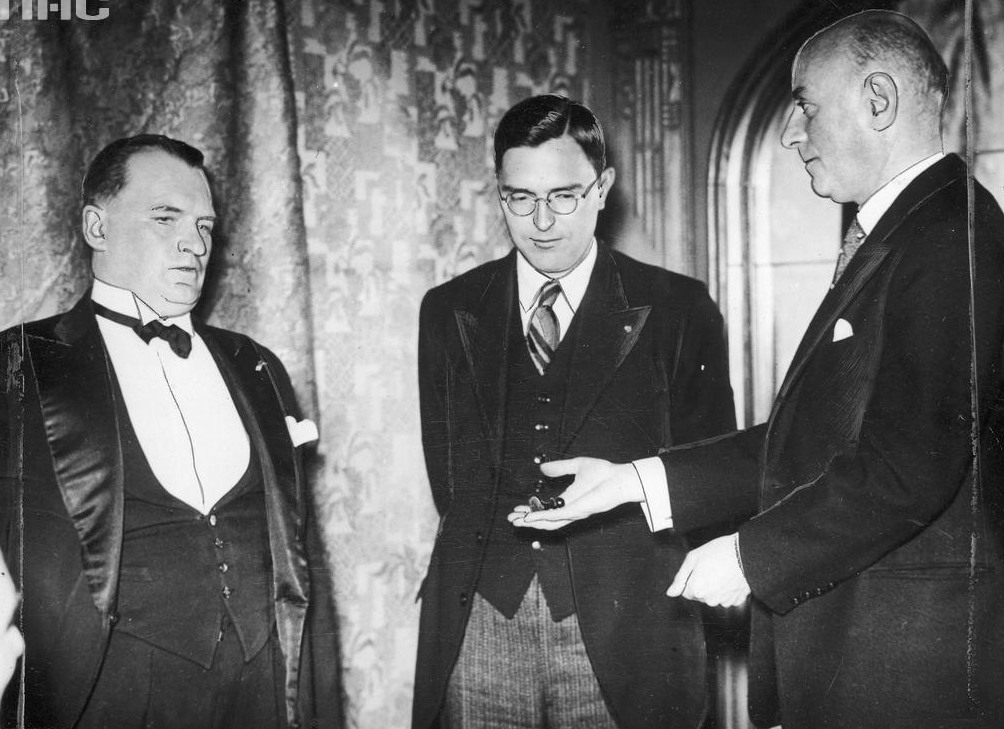According to the regulations of the 1935 World Chess Championship match, in the event of Alekhine losing the title, he was granted the right to return match. Soon after the match has ended, Alekhine challenged Euwe to return match. The latter agreed to play from October to December in 1937. The match was once again played in the Netherlands.
In the late 1930s, FIDE also started to take a heavy interest in the organization of the World Championship. At its Congress held in Stockholm in 1937, just before the return match, FIDE considered the organization of the Championship as one of the top priority.
During the meeting, Chess Federations were asked to nominate a challenger to play the World Champion in a match. In the final round, Salo Flohr beat Capablanca with 8 votes to five and was proclaimed as official FIDE Candidate for the match to be played after the return match Alekhine – Euwe.
In front of all participants, Euwe declared that, in case he wins the match, he will accept Flohr’s challenge in 1940, but that he will first play a match against Capablanca. On the other hand, FIDE President Reub confirmed that if Alekhine should win the match, he would be invited to play Salo Flohr under the FIDE regulations.
In any case, the stage was set for another Alekhine – Euwe clash. However, in only two years, the roles have reversed. This time, Euwe was the one who was considered as a favourite. After all, he had just won the Bad Nauheim tournament 1937 and beaten Alekhine in their individual encounter. It would appear that the same „dizziness due to success“ that cost Alekhine dearly in 1935 match was what troubled Euwe. He obviously underestimated Alekhine, while the latter prepared very seriously:
„Euwe has already mentioned that he was very optimistic before the 1937 Match. He had good reasons to be. Since the 1935 Match, Euwe had played in three tournaments in which Alekhine had also competed and in each Euwe had come out ahead of him. In the individual games he had played against him during this period, Euwe also had a plus score. Alekhine’s results outside of the tournaments already mentioned did not show much promise either. It is not surprising; therefore, that world opinion was strongly against Alekhine at this time. It was thought that this match would not be a real struggle, that it would be a walkover for the World Championship.“
The initial course of the match seemed to reinforce Euwe’s belief in his own success. After five games, he was leading 3-2, but more importantly, he was playing much stronger than the challenger. However, in the sixth game, Alekhine sacrificed his knight on c3. Euwe was dazzled, failed to find his way in the resulting complications and lost in a terrible fashion.
After this stunning game, Euwe also lost the seventh and the eight games, and after a draw in the ninth, also the tenth game. At the middle of the match, Euwe wrote the following:
My match with Alekhine took, all too soon after its commencement, an unfortunate turn for me. The circumstances recall our previous match in 1935, consideration of the play, however, reveals the distinct difference. Two years ago, in the earlier games, my difficulties—often insuperable ones— arose in the openings. This time I cannot criticize myself on score for I have repeatedly obtained thoroughly free and satisfactory positions. But subsequently, I have been making stupid blunders which I simply cannot explain, for they were superfluous blunders, blunders by which I took the initiative in encompassing my own downfall.
However, in the second half of the match, Euwe composed himself and put Alekhine’s nerves on a test. Euwe won the 17th and 18th games and allowed Alekhine to save himself miraculously in the 19th game. Then he also won the 20th game, and the score became very tight: 11-9 in Alekhine’s favour. There was no doubt that the outcome of the match was still unclear and there was no doubt Euwe hoped to reduce the gap even further.
However, the 21st game proved to be the turning point. Euwe played rather uncertainly and anti-positionally and lost quickly. Encouraged by this result, Alekhine played the 22nd game in very inspiring fashion and won that game as well. The fate of the match was virtually decided; by winning the 24th and 25th games, Alekhine won the match and regained the title of the World Champion.
Alekhine – Euwe battles were the first to prove how tricky the return match can be psychologically for the new Champion. Difficulties encountered when having to defend a newly won title against a motivated opponent who doesn’t have anything to lose were latter experienced by both Symslov and Tal against Botvinnik and by Kasparov in his endless battles against Karpov.
Sources:
Chessgames: Alekhine – Euwe World Championship Rematch 1937
Chesspedia: Alekhine – Euwe Rematch 1937
Garry Kasparov On my Great Predecessors: Part One

